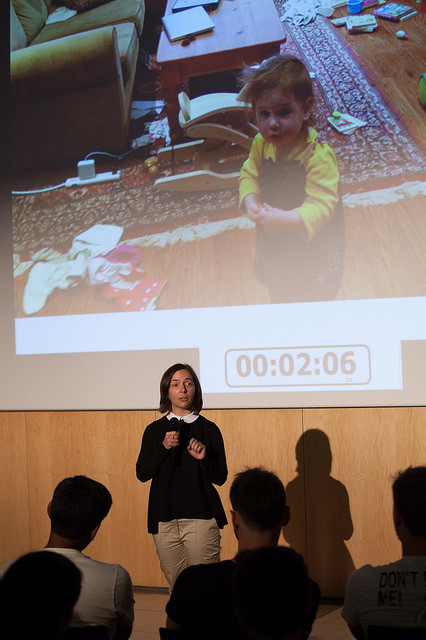"The opportunity to sum up my ideas and my research in four minutes struck me as being a really fun challenge"
"The opportunity to sum up my ideas and my research in four minutes struck me as being a really fun challenge"
"The opportunity to sum up my ideas and my research in four minutes struck me as being a really fun challenge"
 Cristina Galusca has a bachelor's degree in Humanities by the University of Bremen (Germany) and is a student of the doctoral programme in Biomedicine at Pompeu Fabra University. She took an interest in the mental processes underlying learning and is performing her research with the RICO (Reasoning and Infant Cognition) research group, coordinated by Luca Bonatti at the Center for Brain and Cognition (CBC) of the Department of Information and Communication Technologies (DTIC).
Cristina Galusca has a bachelor's degree in Humanities by the University of Bremen (Germany) and is a student of the doctoral programme in Biomedicine at Pompeu Fabra University. She took an interest in the mental processes underlying learning and is performing her research with the RICO (Reasoning and Infant Cognition) research group, coordinated by Luca Bonatti at the Center for Brain and Cognition (CBC) of the Department of Information and Communication Technologies (DTIC).
Galusca won the first edition of the RIN4' competition for her presentation: " Eye remember this", an exercise in scientific outreach by young PhD scientists, aimed at a non-specialist audience that took place on 8 June on the Ciutadella campus.
- How did you come to join Pompeu Fabra University?
I did an interuniversity master's degree in Cognitive Science and Language and one of the universities involved in this programme was Pompeu Fabra University. I loved the Center for Brain and Cognition (CBC), their way of working, the high level and competitiveness of their research, the pleasant atmosphere of the entire team. So, I decided to do my master's degree thesis at the CBC and then continue with the PhD at Pompeu Fabra University.
- What is your area of research?
Within cognitive science, I work in a very wide field. Specifically in the development of cognition. In general terms, I am interested in understanding and discovering how we convey languages and customs, what makes us learn in an efficient way and how we develop the beliefs and habits that define our personalities and cultures.
- Can you explains briefly what your research consists of?
I am in the second year of the doctoral programme trying to understand how non-communicative or ostensive signals (the gaze, eye contact, finger pointing, etc.), are involved in the acquisition of linguistic and non-linguistic information, in the short and long term.
At the moment, I am focusing on the role of the gaze. Eye contact is one of the most common ostensive signals, and also the one to appear ea rlier in humans, with powerful communicative content that makes the recipient of the message clear. Since it is believed that ostensive signals precede linguistic communication and support the learning of language, my main interest is to investigate how the gaze influences in the acquisition of words and other types of knowledge.
"Eye contact is one of the most common ostensive signals, and also the one to appear earlier in humans"
- How did you decided to go in for the RIN4' competition?
When I found out about RIN4' I loved the idea of holding this competition at the University. I'm quite an avid follower of TED Talks and every time I have five minutes or I want to take a short rest I look at one of these 2 or 3 minute mini-conferences. The opportunity to sum up my ideas and my research in four minutes struck me as a really fun challenge.
- Did anyone encourage you to go in for it?
A lot of my fellows were interested in the competition and we encouraged each other to participate. I was excited to pass the first round qualifiers and I especially liked the audience asking questions and showing an interest in my research after my presentation.
- Has this experience helped you in your research?
The experience has been very helpful to me. For a researcher, to be able to spread and share knowledge in a clear and reasoned way is very important and this skill should be prioritized and more highly valued. In addition, in particular, participating in RIN4' was very rewarding and useful because I was able to put into practice precisely what I'm studying: how to present information in a clear, efficient and easily understood way.
" For a researcher, to be able to spread and share knowledge in a clear and reasoned way is very important and this skill should be prioritized and more highly valued."
- What procedure did you follow to organize your speech?
When you have just 4 minutes to present your doctoral project, the key is to think about each word and make sure there's nothing unnecessary, that is to say, each word, sentence or gesture should contribute to the final message you want to convey to the public.
When I was preparing my exposé, I imagined it as a fun and easy narration that little by little introduced "characters" and "contents". My goal was to make the audience a character from my "story" so it could connect with the subject and understand the importance of my research.
"Make the audience a character from my "story" so it could connect with the subject and understand the importance of my research"
- What are your plans for the future and what would you hope to achieve?
I intend to stay in the world of research with the aim of contributing all I can to the knowledge of how we convey culture and language. I have always liked interdisciplinary perspectives and I think that my research topic falls within this approach.
